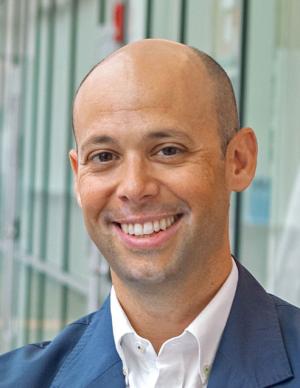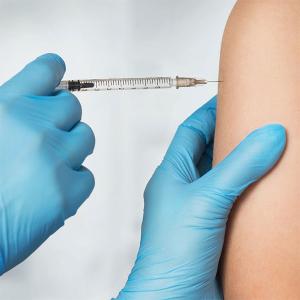Date Posted, by Susan Jenks
One of the first-ever vaccines for the prevention of colorectal and other cancers in patients at high genetic risk for these malignancies is expected to start its early phase safety and immunogenicity trial in the first quarter of 2022, according to investigators.
Although still in the design phase, the study will test a neoantigen-based vaccine against Lynch syndrome, a common hereditary condition that carries a 70-80% lifetime risk for colorectal cancer. The syndrome also raises the risk for developing endometrial cancer and several other cancers, often before age 50 years.
Developed by Nouscom, a Switzerland-based cancer vaccine startup, the vaccine contains 209 cancer-specific neoantigens. Investigators hope to prime the immune system to elicit a powerful immune response in individuals with Lynch syndrome long before a cancer develops.
Neoantigens are expressed only in premalignant or malignant tissues, such as in Lynch syndrome-associated neoplasms. Using neoantigens provides a precision-targeting approach long sought in cancer prevention and therapy. The hope is that this approach will render specific tumors vulnerable, or more visible to immune-system attack, while sparing non-malignant and healthy cells.

Dr. Eduardo Vilar-Sanchez
Preclinical studies in mouse models that mimic Lynch syndrome and ongoing clinical studies in people with advanced disease suggest that this type of vaccine will work well. Lynch syndrome carriers express unique neoantigens that stimulate the immune response. Alternative prevention vaccine strategies use tumor-associated antigens also found in low levels in healthy tissues, such as MUC1, which is present in many adenocarcinomas, or HER2 in breast cancers.
What makes Lynch syndrome a promising vaccine candidate is that the neoantigens expressed by tumors in this condition are predictable. But questions yet to be answered include: which neoantigens generate the strongest immune response; how many neoantigens might be needed to achieve an anticancer effect; and which ones are shared by different individuals. Scientists consider this information essential to the eventual development of off-the-shelf vaccines, which would be widely available to many individuals with inherited vulnerabilities to cancer development.
An estimated 1.1 million people in the United States are affected by Lynch syndrome alone. Although genetic testing can readily detect the syndrome, preventive options are few: frequent colonoscopy screening, risk-reduction surgery, or a low-dose aspirin regimen. A viable preventive vaccine, however, would provide a significant alternative for those facing a genetic predisposition to the syndrome’s many cancers, some of which there is currently no prevention strategy.
“We think that neoantigen vaccines against non-native peptides will be very immunogenic in Lynch Syndrome patients,” said Eduardo Vilar-Sanchez, M.D., Ph.D., the deputy chair of the department of clinical cancer prevention at MD Anderson Cancer Center and the principal investigator in the upcoming vaccine trial, sponsored by the NCI Division of Cancer Prevention. “This type of vaccine offers us the opportunity to stimulate the immune system to get an (anticancer) ad-vantage.”
Lynch Syndrome Strategy May Work for Related Syndromes
If successful, Dr. Vilar-Sanchez said, a similar strategy might work in other related cancer syndromes, where either inherited, or random, genetic errors hinder the body’s natural ability to repair mistakes in DNA as cells copy over their genetic in-formation.

Dr. Steven Lipkin
In Lynch syndrome, the loss of the ability to correct mistakes during DNA copying, known as a mismatch repair deficiency, arises from mutations in one of five genes (MSH2, MLH1, MSH6, PMS2 and the EPCAM gene). Mutations in any one of them can cause errors in short stretches of DNA repeats, called microsatellites, leading to microsatellite instability (MSI).
MSI, when MS loci are located in the coding region of a gene, can cause disruption in the normal flow of genetic information. The resulting defect is seen in almost all Lynch syndrome cancers. In addition, similar defects in mismatch repair and MSI occurs in an estimated 15% of all colorectal cancers.
In the upcoming vaccine trial, participants will have any one of the five Lynch-related gene mutations, according to Steven Lipkin, M.D., Ph.D., a professor of medicine at Weill Cornell Medicine in New York and one of the trial’s collaborators. Whether the vaccine works better in individuals with one type of inherited genetic error over another, he said, will be addressed in the study’s secondary endpoints.
But, given that these genes appear to act synergistically, Dr. Lipkin suggested, a significant difference in response seems unlikely. Also, the broad spectrum of neoantigens included in the vaccine may help induce a broad immune response, he said.
The proposed schedule for the Nouscom vaccine includes two injections—an initial shot, followed by a booster. Dr. Lipkin describes the vaccine delivery system as a kind of a viral-derived Trojan horse that will ferry the large neoantigen payload into the body’s immune cells. Still unsettled is whether a different delivery system might work better. But, research on other approaches is already under way.
Overall, in the phase 1 study for safety and immunogenicity, investigators anticipate vaccinating about 43 individuals diagnosed with Lynch syndrome, who will be recruited from MD Anderson Cancer Center, the City of Hope and Fox Chase Cancer Center and University of Puerto Rico. Depending on trial results, the vaccine will later move into a larger population for clinical evaluation.
Cancer Vaccine Research Comes Full Circle
As scientists await the start of this promising new stage in cancer vaccine development, they credit at least two pioneering studies in Lynch syndrome, with laying the groundwork.
In one study, researchers at the University of Heidelberg in Germany screened over 10,000 neoantigen candidates, before narrowing down the number to three most commonly recurring driver neoantigens with the strongest immune response, which they included in a vaccine. Patients with advanced stage MSI-positive colorectal cancers received the experimental injections.

Dr. Shizuko Sei
“The investigators went after the most common neoantigens because once you know which might be the most immunogenic, you can apply that knowledge to a broader cohort of patients,” said Shizuko Sei, M.D., a medical officer in the Division of Cancer Prevention, referring to the treatment strategy. “The caveat is that three [neoantigens] might not be enough and we may need many more,” to gen-erate a robust and broad antitumor immune response, she said.
Despite encouraging early results, Dr. Sei said, the German researchers’ vaccine study was for cancer treatment, not to prevent cancer from ever forming, or to reduce the cancer risk.
A recently reported preclinical study, however, suggests researchers may be on the right track. It demonstrated that arming vaccines with potent tumor-specific neoantigens can prevent or delay cancer—at least in mice.
The preclinical study, led by Dr. Lipkin, found that vaccinating test mice with four carefully selected Lynch Syndrome-related mouse version of neoantigens, cut in half the number of intestinal tumors seen and improved survival from 240 days to 380 days, compared with the unvaccinated animals. When the over-the counter pain reliever, naproxen, was added to the mix, the Lynch syndrome mice fared even better. (See Study with Common Pain Drug Shows Change in Immune Biomarkers, Feb. 3, 2021.)
“Survival was impressive,” Dr. Sei said. Not only was there a delay in the onset of cancer, investigators saw a significant reduction in tumor burden in the treated mice, as well, she said.
Between these two pivotal studies, cancer vaccine research has come full circle, but not in the usual bench-to-bedside manner. The potential promise of neoantigen vaccines in Lynch syndrome came first from MSI-high colorectal cancer patients’ bedside, before moving into the animal model, Dr. Sei said. “But, now that we’ve got evidence that this approach may work, our hope is to bring it back to the bedside.”
If you would like to reproduce some or all of this content, see Reuse of NCI Information for guidance about copyright and permissions. Please credit the National Cancer Institute as the source and link directly to the blog post using the original title, for example: "Vaccine to Prevent Hereditary Cancers Nears Human Trials was originally published by the National Cancer Institute." For questions, contact us at CancerPreventionBlog@mail.nih.gov.

